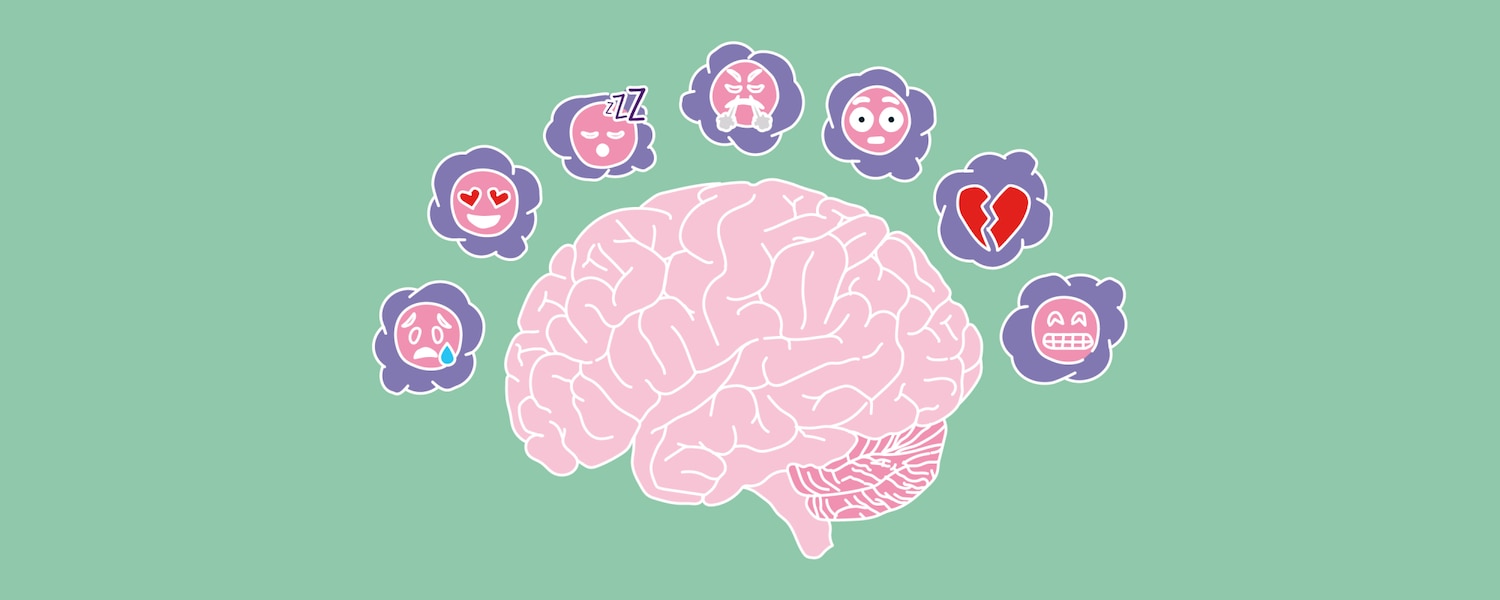Teenage brain: dealing with emotional changes during puberty

Body changes like odour, spots, and becoming taller are what we’d typically expect from adolescence, but what about our brains? Well, they develop too! And this comes with (completely natural) mood swings and emotional changes. So, let's dive into it and learn some tips on how to cope with the ups and downs of puberty.
When we go through puberty, our hormones change how our bodies look. But they can also change the way we behave, think, and feel. So, it’s normal to feel a bit out of sorts as your body (and mind) gets used to it, we all go through it! Learning about why these changes happen and the emotions you can experience during adolescence may help you feel more prepared as well as find healthy ways to deal with them.
How your teenage brain develops during puberty
During puberty, grey matter (the tissue that makes up most of your brain) grows and develops. Some of that grey matter stays in your brain while other parts get ‘pruned' away - it's like plucking loose petals from a flower. But not much is gone! Your grey matter only decreases by about 1.5% a year [1] to help fine-tune the connections between your brain cells – in other words, to help make your brain more efficient!
Different parts of your brain develop at different speeds during puberty. The parts that control basic functions like your senses and the ability to control movement mature first. But the parts that help you plan and control your impulses develop later.
Your brain will continue growing and become stronger, helping you have faster, clearer, and more complex thoughts as you go into adulthood. It officially becomes fully developed when you finally get to age 25, although we all keep learning more about ourselves and others throughout our entire lives. [2]
Adults think by using their prefrontal cortex, which is the rational part of the brain, whereas in your teens you process with the amygdala, which is the emotional part. These two parts of your brain develop at slightly different rates during adolescence, often causing a mismatch between how you feel and how you think. So if sometimes you’re not feeling like yourself, that's totally normal!
Emotional changes during puberty
When our bodies are ready, our brains release a special chemical called gonadotropin-releasing hormone (or GnRH for short) that starts the changes of puberty. [3] Our brain then pours out stress hormones, sex hormones, and growth hormones, which in turn can influence our brain development. [4]
Although the combination of changing hormones and brain structure helps us mature, it can also make our emotions harder to deal with and that’s okay. Remember, you’re not alone and these changes are something we all go through. Let’s explore more in detail what you may experience…
Puberty mood swings
We’ve all been there: one minute, you might feel like floating on clouds, and the next, you might want to cry your eyes out. These on and off intense emotions are known as mood swings, which are mainly triggered by the changes happening in your brain together with hormonal fluctuations. [5]
They also have to do with your new in-between role in life: you’re no longer a child but also not quite an adult yet, and that can be confusing. Not knowing what is expected of you, what you want to do, and what is right or wrong might make you feel anxious. When this happens, try to take a deep breath and remind yourself that you won’t be stuck there forever.
Anxiety
Anxiety is a reaction to unfamiliar or scary situations. It’s that pressure on your chest or that difficulty to breathe for — what seems like — no apparent reason. Our teenage years are filled with new and unknown experiences, so it is only natural to go through some anxiety at this time.
Anxiety can creep up on us, mess with our sleep or make it hard to concentrate in class, and when it hits, it's easy to think it’s there to stay. But in many cases, anxiety passes on its own when your hormones settle down in your late teen years. However, if you’re experiencing severe anxiety over a long period, it’s a good idea to talk to your family, someone you trust, or even a school counsellor. They’ll be able to give you some reassurance, explore what’s going on, and help you find ways to cope.
How to deal with your puberty emotions
Riding this emotional rollercoaster can leave you feeling overwhelmed, but remember that over time, your emotions will level out. While it might take some time to adjust, it does become easier. After all, every teenager experiences puberty emotions and mood changes! And with a few tips and tricks, you can learn to navigate them more easily.

Exercise improves your mood and helps you feel more energetic and positive, even if it’s just a walk.

Finding things you enjoy will make this whole phase so much easier. Try walks with friends, listening to music, or even cuddling a pet.

Having the right amount of sleep is important. Not only will you feel refreshed, but getting enough sleep is related to better brain health. [6]
Keep a diary
You may feel confused, lonely, angry, happy, and sad when you’re going through puberty. Practising naming your emotions by scribbling thoughts in your diary can help you notice how they change and what triggers them. You could also keep notes on your phone, so you don’t forget to write them down later. Sometimes just recognising certain feelings early on makes it easier to ride them out.
Talk to people you trust
It can feel good to share what you’re going through with someone close to you – whether it’s with a friend, sibling, parent, or even a teacher. Sometimes, simply letting your emotions and anxieties out can lighten the load. And even if you can’t work out an exact solution yet, a big hug and squeeze can help you feel better and less alone.
Take some me time
Just because your brain is in overdrive doesn’t mean that you should be too! Having some “me time” can help you figure out your emotions when you are going through puberty. If you're feeling down, why not stay in your room wearing comfy clothes and listening to your favourite album? Or perhaps painting or reading a book? It’s always a good idea to do what you love, relax, and take some time for yourself, especially if there’s a lot going on with school and friends or family.
Growing up is not always easy, so try not to beat yourself up when your moods shift. It’s only human. And particularly during puberty, it’s very common. Just because you’ve felt blue for a few days, doesn’t mean you’ll always be sad. Or just because you’ve been shouting a lot recently, doesn’t mean you’ll always be angry. Remember it’s your hormones and brain that are being a bit difficult.
Treat yourself (and your friends, who are likely going through the same) with kindness during this time. And if your feelings get out of hand and you hurt someone, the best you can do is sincerely apologize and try to do better next time... we all make mistakes.
To get you through puberty, you can also reach out to a school counsellor for support or even ask an adult you trust to get you an appointment with a therapist who can help you find other ways to cope with your emotions. It’s okay to ask for help, you don’t have to figure this out by yourself!
Understanding exactly what’s going on in your mind and body can help you feel better about the changes you’re experiencing. So why not learn more about the hormonal phases of your menstrual cycle or what’s up with body image and objectification?
[References]
source-1[1] Mills, K. L., Goddings, A. L., Herting, M. M., Meuwese, R., Blakemore, S. J., Crone, E. A., et al. 2016. Structural brain development between childhood and adulthood: convergence across four longitudinal samples. Neuroimage 141:273–81. doi: 10.1016/j.neuroimage.2016.07.044.
source-3[3] Experts, K.H.M. (ed.) Everything you wanted to know about puberty (for teens) - nemours kidshealth, KidsHealth. The Nemours Foundation. Available at: https://kidshealth.org/en/teens/puberty.html (Accessed: December 12, 2022)
source-4[4] The adolescent brain: Beyond raging hormones (2011) Harvard Health. Available at: https://www.health.harvard.edu/mind-and-mood/the-adolescent-brain-beyond-raging-hormones (Accessed: December 12, 2022)
source-5[5] Mayo Clinic Q and a: Rapid mood changes normal for teens - Mayo Clinic News Network (2022) Mayo Clinic. Mayo Foundation for Medical Education and Research.
source-6[6] Lock, Sarah & Chura, Lindsay & Barracca, Nicholas. (2017). The Brain-Sleep Connection: GCBH Recommendations on Sleep and Brain Health. 10.26419/252Fpia.00014.001.pdf.


